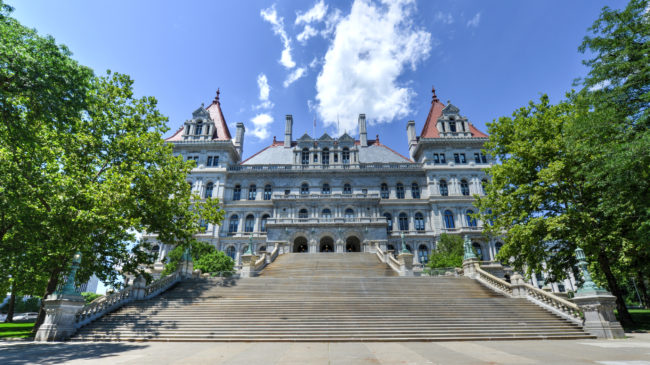New York state is at the epicenter of the COVID-19 emergency. As the state scrambles to ensure its health care infrastructure can handle the surging number of patients, it’s disappointing to see some respected groups pushing for extreme policies that could exacerbate the crisis. The New York Daily News reports:
A group of doctors and medical professionals think forcing New Yorkers to kick the habit will help battle coronavirus.The New York State Academy of Family Physicians is urging Gov. Cuomo to issue an executive order banning the sale of all tobacco products, citing a study that found smokers are at an increased risk of being impacted by the respiratory illness.
“As our state and country struggle to respond to the rapidly evolving and escalating COVID-19 pandemic affecting our residents and straining our healthcare system, mounting evidence demonstrates the link between tobacco use and increased risk for progressive COVID-19,” the group’s president, Dr. Barbara Keber, said in a statement.
Their case for the prohibition is based on a Chinese study of COVID-19 patients suggesting that smoking was associated with 14-fold higher odds of disease progression. The problem for NYSAFP is that the study with “mounting evidence” that they cite included just five smokers, three of whom had disease progression, making the sample size small and data unreliable, notes Dr. Konstantinos Farsalino.
More than half the male population of China smokes, while fewer than three percent of Chinese women smoke. It has been speculated that the country’s high male smoking rate could be the reason why fewer women were suffering from COVID-19 than men. Fortunately, three scientists published a study on March 23, examining all the available data on current smoking prevalence among hospitalized patients with COVID-19 in China. According to the study’s authors, which include New York University’s Raymond Niaura, the prevalence of smoking among hospitalized COVID-19 patients was not unusual given China’s high smoking rate. They conclude:
This preliminary analysis does not support the argument that current smoking is a risk factor for hospitalization for COVID-19, and might suggest a protective role. The latter could be linked to the downregulation of ACE2 expression that has been previously known to be induced by smoking. No studies recording e-cigarette use status among hospitalized COVID-19 patients were identified. Thus, no recommendation can be made for e-cigarette users.
The scientific case for the prohibition of all tobacco products in response to the coronavirus pandemic remains weak, and for e-cigarettes it is non-existent.
If New York were to move forward with a tobacco ban, it could be disastrous. Does New York really want its citizens driving across state lines in search of tobacco products at this time? Just this week USA Today reported, “Travelers leaving the New York metro area should self-quarantine for 14 days to make sure they aren’t passing on the coronavirus, a member of the White House Coronavirus Task Force said Tuesday.”
It seems unlikely the governor will act on this particular call to ban tobacco products. Still, it’s troubling to see medical professionals use weak, sparse evidence in the midst of a pandemic to push what would be a hugely controversial policy even in normal times.
While the prohibition of all tobacco products may be unlikely to go-ahead in the short-term, the vast majority of e-cigarettes could soon be banned in New York state. A ban on all non-tobacco e-cigarette flavors, which comprise the vast majority of the market, is included in Senate Bill S7507A, a law that is “necessary to implement the state health and mental hygiene budget for the 2020-2021 state fiscal year.”
E-cigarettes are dramatically safer than combustible cigarettes and one of the most effective tools to help smokers quit. How they should be regulated is an arena for reasonable debate. But getting smokers to switch to e-cigarettes is good for public health while eliminating most of the e-cigarette market is the inverse of good public health policy. According to research from the Georgetown University Medical Center, replacing cigarettes with e-cigarettes over a 10-year period would result in 6.6 million fewer premature deaths. But if the majority of the e-cigarette is market removed, it’s likely that many vapers who would be unable to use their preferred products could go back to smoking cigarettes.
It is interesting to note that in the European countries hardest hit by COVID-19, including Italy, Spain, and France, the governments wisely decided to keep their vape shops open. They determined it was important to ensure e-cigarette users would continue to have access to safer alternatives to traditional cigarettes. Additionally, there are no limits on e-cigarette flavors in those countries.
At this time when millions of New Yorkers are practicing social distancing and taking other precautions, many smokers may voluntarily take the opportunity to rethink their habit and consider switching to e-cigarettes, a safer alternative. It would be a public health tragedy if, at the exact moment many smokers may be motivated to think about quitting, the most effective tool to help people quit smoking becomes illegal in New York state.

